‘The ICC’s findings so far have only scratched the surface’
Netanyahu and Gallant's arrest warrants are a victory for international justice even if enforcement remains a challenge, says Palestinian lawyer Raji Sourani.

Last week, the International Criminal Court in The Hague issued arrest warrants for Israeli Prime Minister Benjamin Netanyahu and former Defense Minister Yoav Gallant. The court’s judges, in their Nov. 21 ruling, foundthat there were reasonable grounds to believe that the pair were responsible for war crimes and crimes against humanity committed in the context of Israel’s ongoing war on Gaza — namely, using starvation as a method of warfare, as well as “murder, persecution, and other inhumane acts.”
The ICC’s judges issued an additional warrantfor the arrest of Hamas’ military chief Mohammed Deif, whom the Israeli army claimed it killed in July but whose death Hamas never confirmed; the group insisted at the time that Deif survived the assassination attempt, but has reportedly since acknowledged that he likely died. The court’s chief prosecutor, Karim Khan, had also requested arrest warrants for Hamas leaders Ismail Haniyeh and Yahya Sinwar, but Israel subsequently killed both men, in August and October respectively.
The ICC launched a formal criminal investigation into war crimes and crimes against humanity in Israel-Palestine in 2021, when judges ruled that the court has jurisdiction over crimes committed in the occupied Palestinian territories and those committed by Palestinians inside Israel. The scope of the investigation dates back to 2014, but these warrants relate specifically to the period between Oct. 8, 2023, and May 20, 2024.
The decision also spells the defeat of an almost decade-long multi-agency Israeli campaign of surveillance and intimidation that aimed to thwart the ICC’s probe, which +972 Magazine and the Guardian revealed earlier this year.
To understand more about the significance of this ruling, +972 spoke with Raji Sourani, a human rights lawyer and director of the Gaza-based Palestinian Center for Human Rights (PCHR), one of several Palestinian human rights organizations that Israel surveilled while it provided testimony to the chief prosecutor’s office. In the following conversation, Sourani — who is currently based in Cairo, after fleeing the genocide in Gaza — unpacks the legal and political ramifications of the ICC’s decision, its historical context, and what it means for accountability in the ongoing Israeli assault on the Strip.

Raji Sourani (Courtesy)
The interview has been edited for length and clarity.
Can you break down what it means that the ICC has issued arrest warrants for Netanyahu and Gallant?
The decision to issue these warrants after a meticulous legal review signals the seriousness of the charges. It affirms allegations of Netanyahu and Gallant bearing responsibility for war crimes and crimes against humanity, particularly the use of starvation as a weapon of war and the intentional targeting of civilians in Gaza.
However, as significant as this step is, enforcement remains the ICC’s Achilles’ heel. While it has the authority to prosecute crimes of this magnitude, the court has no independent police or military force to execute these warrants. It relies entirely on its 124 member states, who are signatories to the Rome Statute [the court’s founding treaty], to act as its enforcers, arresting suspects within their borders. While this is a legal obligation under international law, enforcement is often subject to the political will of these states.
So should we expect to see them stand trial anytime soon?
Historically, the court’s reliance on member states to enforce warrants has led to selective compliance. For example, when Sudanese President Omar Al-Bashir was indicted for war crimes in Darfur, he travelled to several ICC member states without being apprehended. Similarly, Russian President Vladimir Putin, wanted for alleged war crimes in Ukraine, was recently welcomed in Mongolia, another ICC member, without consequence.
In the case of Netanyahu and Gallant, much will depend on where they travel, which is something they must now think carefully about. Initial reactions to the warrants have been encouraging, with several countries and organizations reaffirming their commitment to international justice. The European Union, with all 29 of its member states bound by the Rome Statute, has indicated through Josep Borrell [the EU’s high representative for foreign affairs and security policy] that they are obligated to act on these warrants. However, the political ramifications of arresting sitting or recently serving Israeli officials could deter even the most committed states.

Josep Borrell, during his hearing for the position of the High Representative of the Union for Foreign Affairs and Security Policy of the European Union, October 7, 2019. (European Parliament)
The United States, a staunch ally of Israel and also not an ICC member, has openly condemned these warrants. This geopolitical shielding undermines the ICC’s authority and complicates its ability to hold powerful actors accountable.
How might the United States’ opposition shape the global response to the warrants and, more broadly, affect the credibility and enforcement of ICC rulings?
The U.S. response to the ICC warrants is deeply troubling but not surprising. Historically, the United States has acted as Israel’s most ardent defender on the international stage, providing it with military aid, political cover, and diplomatic immunity. But its response to the warrants is both hypocritical and contradictory.
The United States frequently invokes international law to criticize adversaries, yet it rejects the very institutions it expects others to respect when its allies are implicated. Notably, it is not a signatory to the Rome Statute, the treaty that established the ICC. This undermines its moral authority to challenge the court’s legitimacy while also highlighting its unwillingness to be subject to the same standards it promotes globally.
The White House’s outright dismissal of the ICC warrants is a dangerous signal. It emboldens Israel to continue its policies of occupation, settlement expansion, and military aggression with the assurance of American protection. Furthermore, it discourages other nations from cooperating with the ICC out of fear of political repercussions.
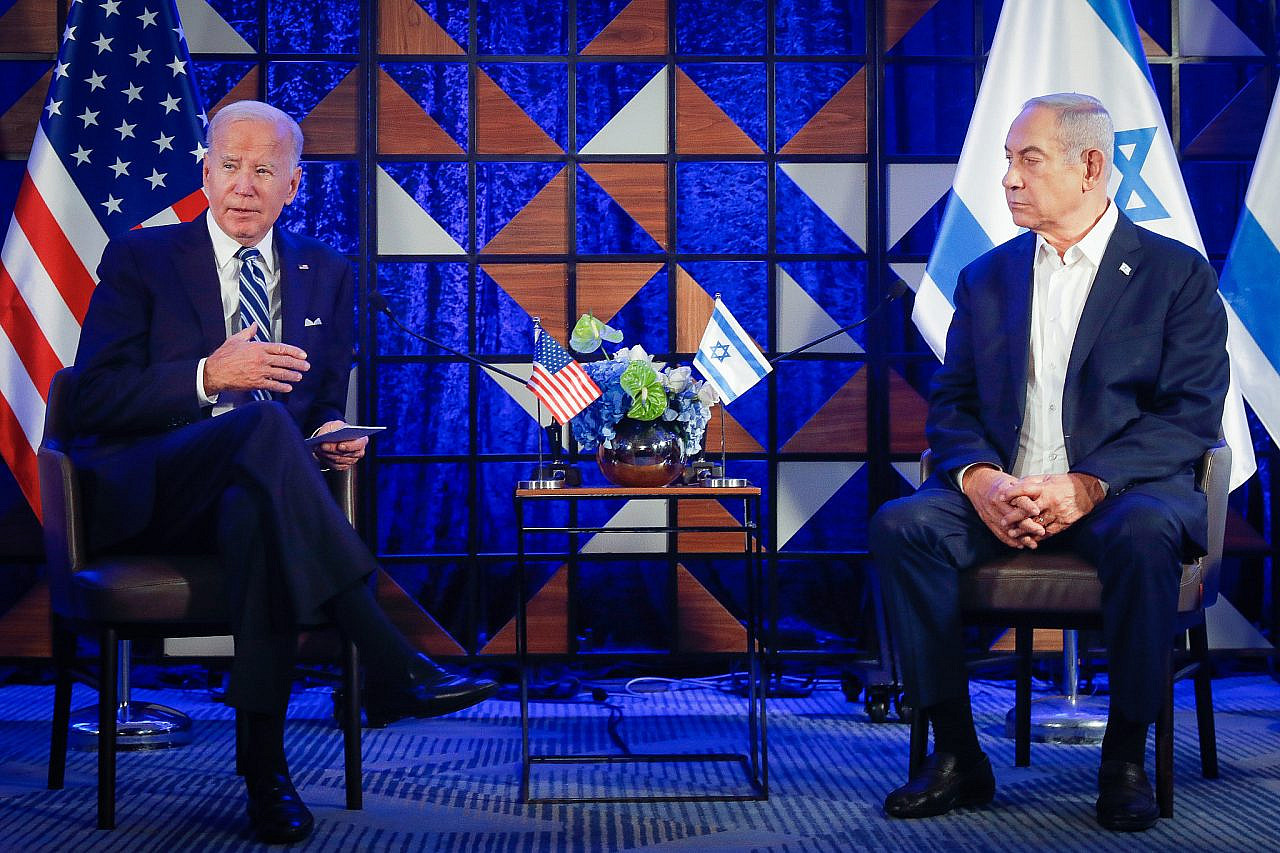
Israeli Prime Minister Benjamin Netanyahu meets with U.S. President Joe Biden in Tel Aviv, October 18, 2023. (Miriam Alster/Flash90)
International law’s credibility relies on its universal application. Selective enforcement undermines the entire system and raises legitimate questions about its impartiality. When powerful nations or their allies evade accountability, the rule of law becomes subordinate to political power.
The ICC, to its credit, has sought to challenge this perception by targeting individuals from both powerful and weaker states. However, the failure to enforce these warrants risks reinforcing skepticism about its ability to act as a true arbiter of justice.
What needs to happen in order for Israel’s leaders to actually be brought to justice?
The ICC’s role as a “court of last resort” means that its success depends on the broader international community’s willingness to uphold the rule of law. If member states fail to enforce these warrants, it risks turning accountability into a symbolic gesture rather than a tangible outcome.
This marks the beginning of a long legal and political battle. For justice advocates, the challenge is to ensure that the ICC’s decisions are not only recognized but also acted upon, even in the face of immense political pressure. And international actors must prioritize legal obligations over political alliances.
While this is easier said than done, sustained pressure from global movements can shift the political calculus over time. Even in states with strong political ties to Israel, public opinion and grassroots pressure could make non-compliance politically costly.

Pro-Palestinian protesters in Washington demonstrate against Prime Minister Benjamin Netanyahu during his speech to the U.S. Congress, July 24, 2024. (Arie Leib Abrams/Flash90)
Lastly, the ICC must remain steadfast in its mission, despite the obstacles. It may work slowly and face setbacks, but the court’s existence is a testament to the enduring pursuit of justice. Every step, however incremental, contributes to the larger goal of holding perpetrators accountable and reaffirming the principles of international law.
Does the lack of enforcement mechanisms diminish the significance of these warrants? Will they have any other impact?
Issuing these warrants carries immense symbolic and legal weight. It is a victory for the principles of international justice, representing a critical step toward accountability for war crimes and crimes against humanity. It sends a powerful message that no one is above the law, not even the leaders of states with significant military and political power.
The warrants also challenge the long-standing perception that Israel operates with impunity. They vindicate decades of meticulous efforts by Palestinian civil society and international human rights organizations to document Israel’s violations in Gaza, the West Bank, and East Jerusalem, laying the groundwork for the ICC’s investigation and pressuring the international community to act. It is a milestone that strengthens the global recognition of Palestinian rights, even if it does not immediately deliver justice on the ground.
The decision also establishes a legal precedent that aims not only to hold individuals accountable but also to act as a tool of deterrence that could influence future actions by other leaders and countries.
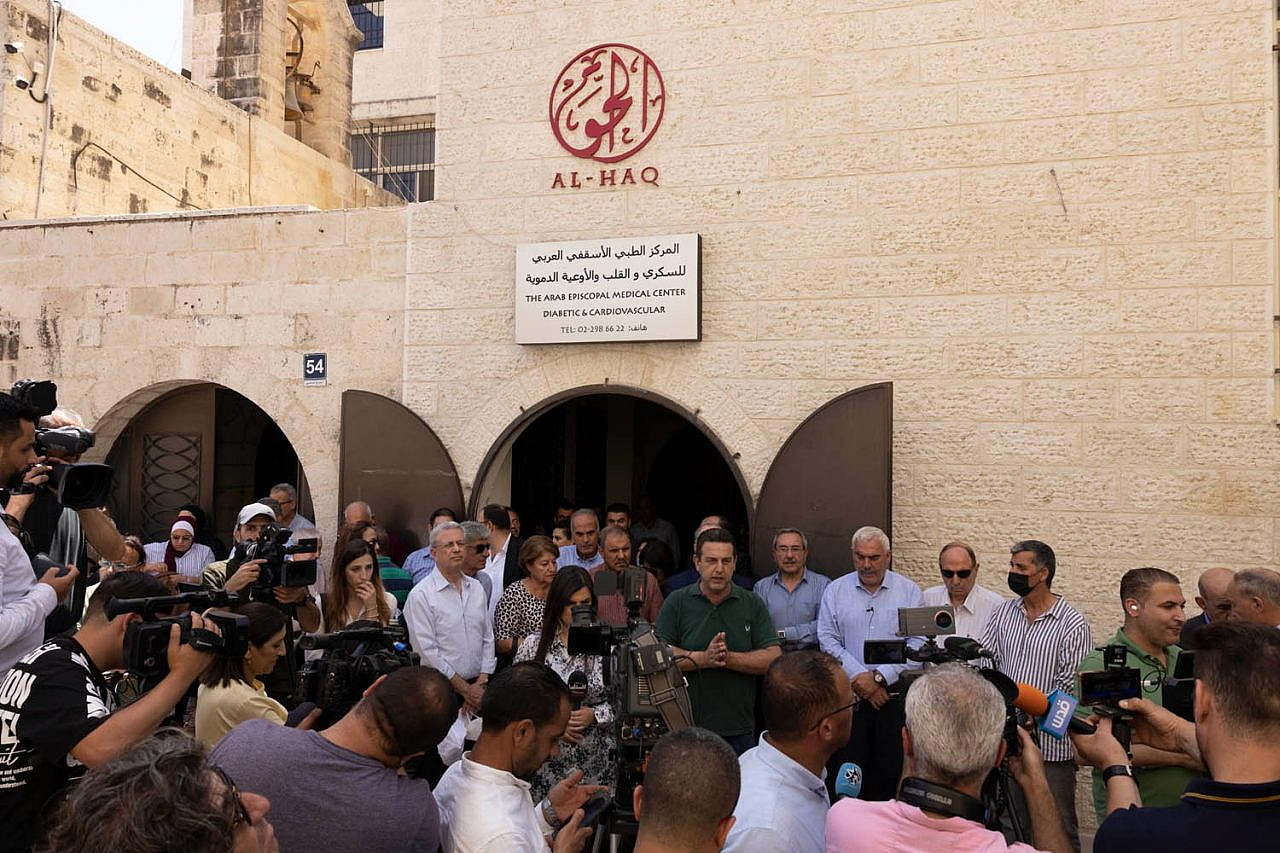
Heads of Palestinian NGOs speak to the media outside of Al-Haq’s offices after the Israeli army raided their offices, Ramallah, West Bank, August 18, 2022. (Oren Ziv)
What do you make of the court’s decision to issue an arrest warrant for a Hamas leader alongside Israeli leaders?
Targeting civilians is a violation of international law, no matter the context. But there is a need to uphold Palestinians’ rights to self-defense and resistance within the bounds of international law. I think focusing on individuals like Deif without addressing the broader context of occupation and apartheid risks undermining the legitimacy of the Palestinian struggle, and equating the occupied with the occupier.
The decision to issue a warrant for Deif can be seen as part of a pattern whereby the international community places disproportionate focus on the actions of the oppressed rather than the oppressor. I’ve long emphasized that the Palestinian struggle exists within the context of prolonged occupation, blockade, and systemic violence, which creates conditions where resistance emerges. International rulings need to reflect this broader reality.
True justice requires a comprehensive approach that holds all parties accountable, particularly those in positions of power perpetuating systemic violence. There has to be a stronger focus on Israel’s actions and for the international community to address the structural conditions that drive conflict.
Considering the breadth of the ICC’s investigative scope, do you foresee additional indictments for other individuals implicated in these alleged crimes?
Additional indictments are not just possible — they are probable. The ICC’s jurisdiction covers crimes committed since 2014, a period that encompasses a wide range of documented violations, including extrajudicial killings, illegal settlements, and the blockade of Gaza. These are not isolated incidents but part of a broader pattern of systemic oppression.

Al-Haq director Shawan Jabarin hands a confidential communication to ICC Prosecutor Fatou Bensouda in the Hague, November 23, 2015. (Photo courtesy of Al-Haq)
The ongoing nature of these crimes ensures that the investigation will expand. The ICC’s findings so far have only scratched the surface. The court is building a comprehensive legal framework that will likely implicate other high-ranking officials and military commanders. This is a long process, but the implications are far-reaching.
The warrants may also serve as a deterrent to other Israeli political and military officials, signalling that they, too, could face international accountability. It could lead them to be more cautious in their operations in Gaza or Lebanon due to the threat of future arrest warrants.
Besides the potential for the arrest of Netanyahu and Gallant, what other economic and diplomatic consequences could arise from the court’s ruling?
The ICC’s decision has far-reaching economic and diplomatic implications, particularly for Israel’s relationships with the EU. As Josep Borrell rightly stated, this is a legal decision with binding consequences for EU member states. Israel’s preferential trade agreements with the EU, which exempt 65 percent of its exports from customs duties, are now under serious scrutiny.
It is ethically and legally indefensible for the EU to maintain these privileges while the sitting prime minister of Israel face charges of genocide and war crimes. Similarly, Israel’s participation in European sports leagues, cultural exchanges, and academic programs like Erasmus must be reconsidered. These partnerships starkly contradict the legal and moral weight of the ICC’s findings.
Economic consequences could extend beyond the EU. Countries in the Global South, many of which have been vocal in supporting the ICC’s mandate, may impose their own restrictions on trade and collaboration with Israel. This would not only isolate Israel diplomatically but also pressure it to comply with international law.
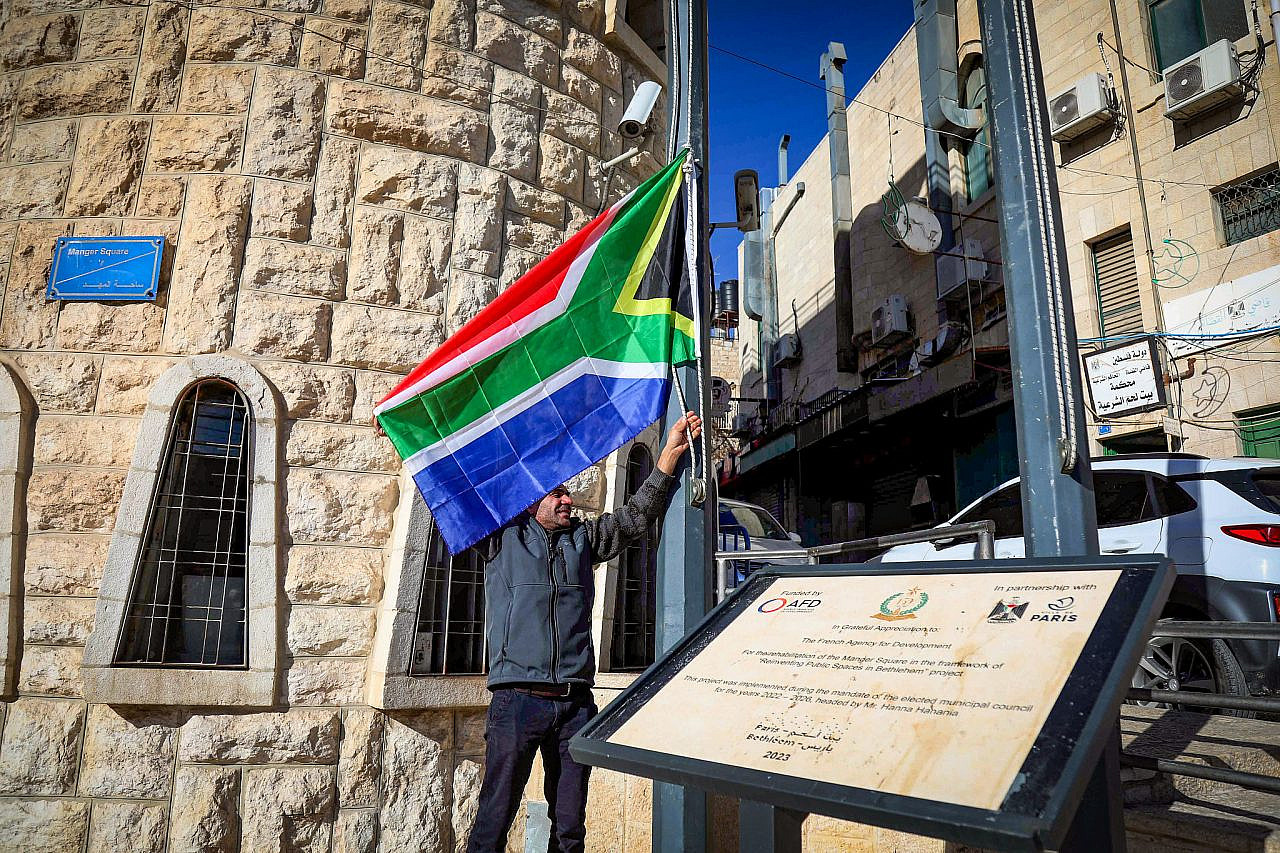
Bethlehem Municipality employees raise a South African flag in support of their lawsuit against Israel to the International Court of Justice (ICJ), in the West Bank city of Bethlehem, January 16, 2024. (Wisam Hashlamoun/Flash90)
Israel has a long history of resisting external pressure, often doubling down on its policies in the face of international criticism. However, sustained economic and diplomatic isolation could force a recalibration. The loss of preferential trade agreements or cultural partnerships would not just harm Israel economically but also erode its international legitimacy.
Ultimately, the ICC’s decision is a watershed moment. It sets a new standard for accountability in the Israeli-Palestinian conflict, challenging the status quo and opening the door for broader legal, political, and economic consequences. Whether these pressures will compel Israel to change its policies remains to be seen, but the precedent has been set, and the world is watching.
You’ve highlighted the West’s hypocrisy when it comes to addressing war crimes. How does the international response to Palestine differ from other conflicts, such as that between Russia and Ukraine?
The international response to Palestine has long been characterized by a glaring double standard. The contrast with the reaction to Russia’s invasion of Ukraine is a stark example. Within months of the invasion, the ICC indicted Vladimir Putin, and the international community imposed sweeping sanctions on Russia. This swift and decisive action underscores a global consensus that war crimes must not go unpunished.
Yet, when it comes to Palestine, the same urgency is glaringly absent. For decades, Palestinians have faced systematic violence, displacement, and occupation, but the international response has been tepid at best. Calls for sanctions against Israel or legal accountability for its leaders are met with resistance, often dismissed as politically motivated or antisemitic.
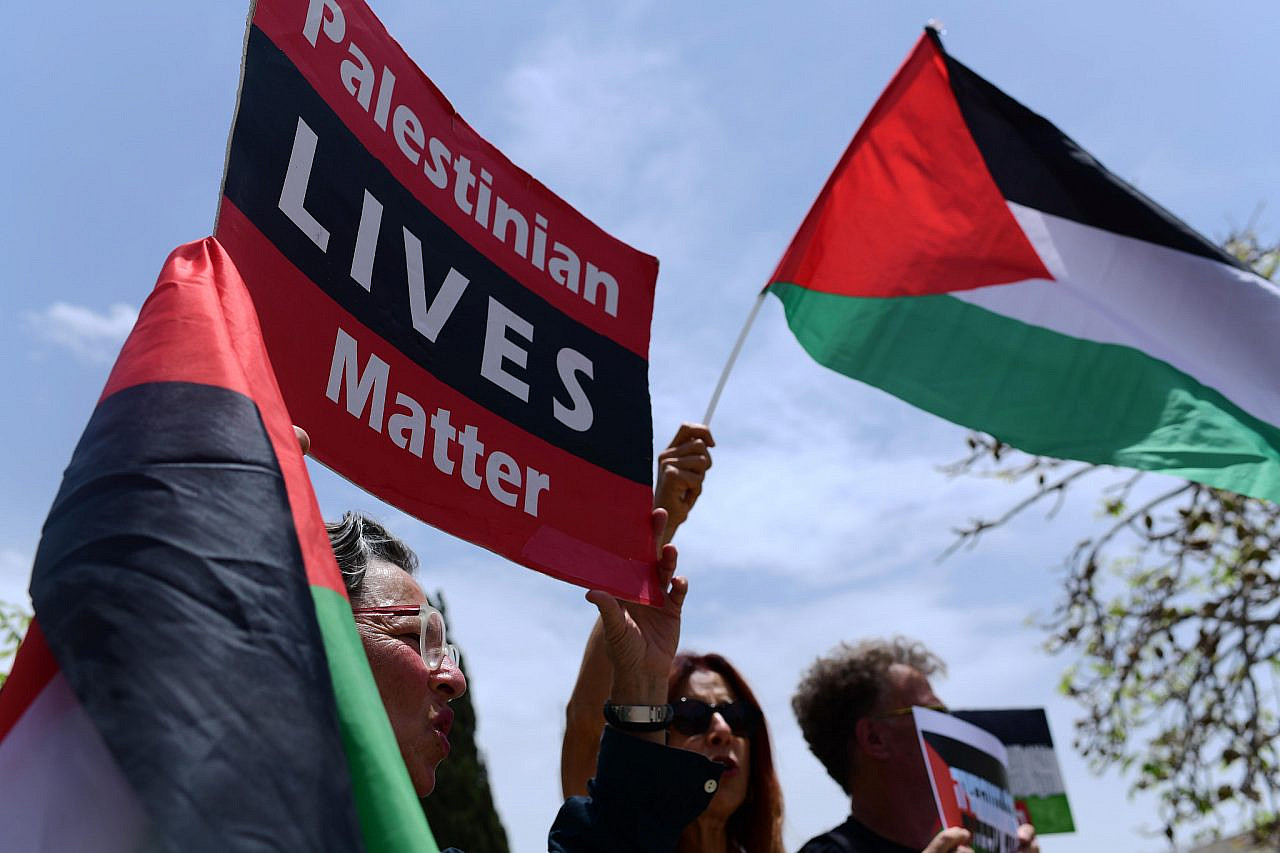
Palestinian students protest against a bill that would ban waving Palestinian flags at Israeli universities, at the Tel Aviv University, May 28, 2023. (Tomer Neuberg/Flash90)
This hypocrisy erodes the credibility of international law and institutions, raising serious questions about their impartiality. It also reinforces the perception that the rights of Palestinians are less important than those of others. However, the ICC’s recent decision challenges this narrative, signaling that even Israel’s leaders are not immune from scrutiny.
What does the ICC’s ruling symbolize for the Palestinian struggle for justice and liberation?
The road to justice is fraught with challenges. Israel and its allies have vigorously opposed ICC proceedings, using political, legal, and even coercive measures to derail accountability efforts. Legal professionals involved in these cases have faced threats, while Israel continues to dismiss the court’s jurisdiction.
Despite these obstacles, the Palestinian legal community has remained steadfast. Over decades, they have meticulously documented atrocities, built robust legal cases, and presented irrefutable evidence to international bodies. The ICC’s decision is a testament to their resilience and dedication. It represents a growing recognition of Palestinian rights on the international stage and challenges the long-standing impunity enjoyed by Israel.
At the same time, it is essential to recognize that justice for Palestinians will not come solely through legal channels. It requires a broader political, social, and international commitment to addressing the root causes of the conflict: occupation, displacement, and apartheid.
The ICC’s decision is significant, but it is only one piece of a much larger puzzle. The broader struggle for justice and liberation continues, empowered by the resilience and determination of the Palestinian people. As international attention grows, so too does the imperative to act decisively and hold Israel accountable for its actions.

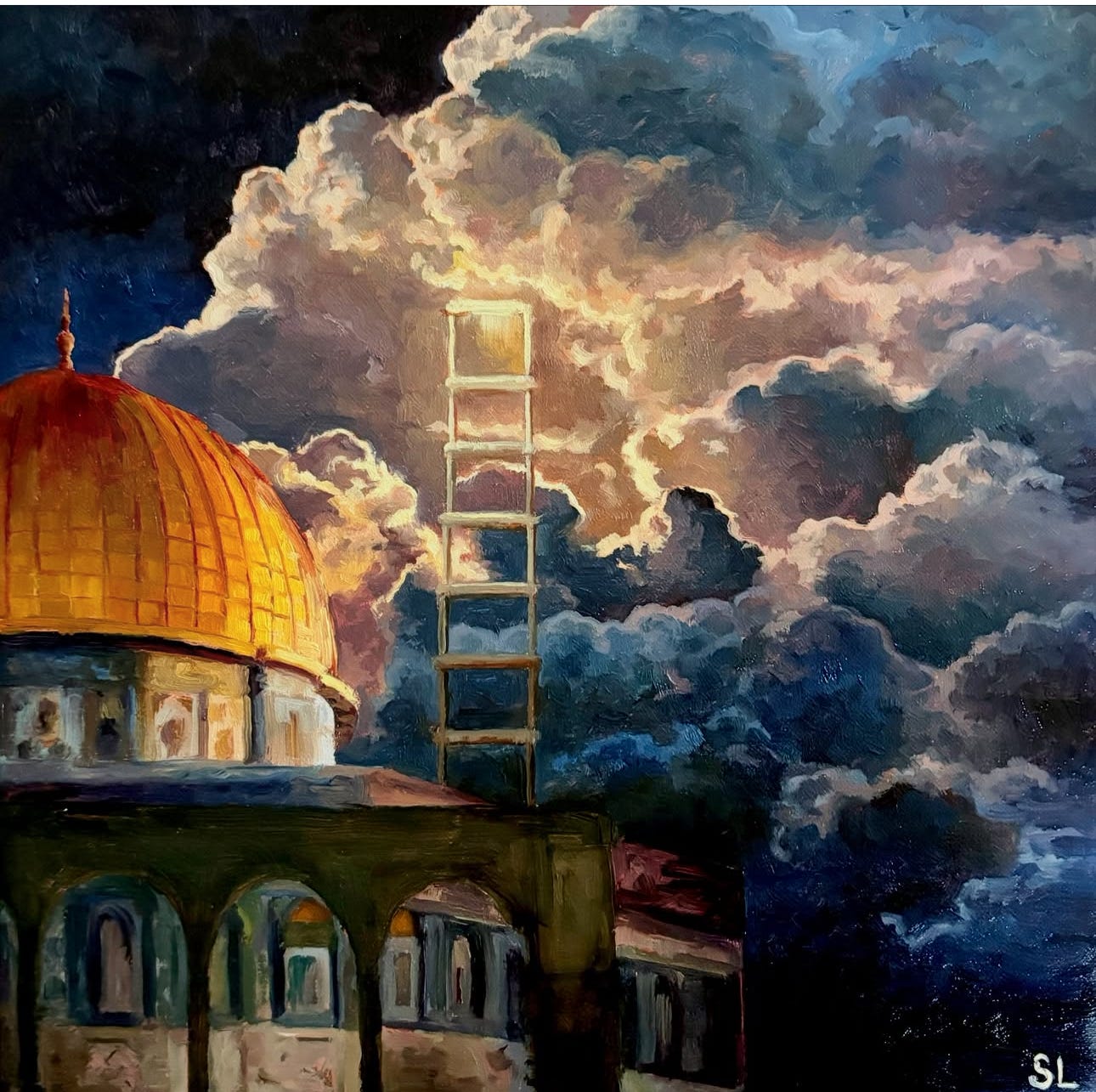
No comments:
Post a Comment